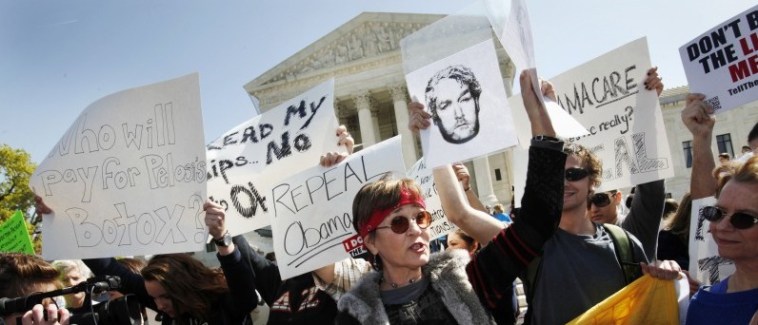A new government estimate shows yet another way how Obamacare may ding the economy, and the law’s defenders are at pains to explain how this is a feature, not a bug.
Videos By Rare
First, the estimate: The Congressional Budget Office says Obamacare will reduce full-time employment by the equivalent of 2 million jobs by 2017, rising to 2.5 million over the next decade. The CBO explains this is primarily because people will choose to work less in order to qualify for Obamacare’s insurance subsidies.
And less work, Obamacare’s defenders argue, is a good thing!
Here’s how Jason Furman, chairman of the Council of Economic Advisers, put it according to Politico:
“Furman noted the availability of affordable health insurance may mean that a worker can cut back by a few hours each week and still be able to afford the same quality of life. ‘This is not businesses cutting back on jobs. This is people having new choices,’ he said during a 45-minute question-and-answer session with White House reporters.”
The Los Angeles Times quoted liberal economist Dean Baker saying the new estimate shows Obamacare helps “older workers with serious health conditions who are working now because this is the only way to get health insurance. And (one for the family-values crowd) many young mothers who return to work earlier than they would like because they need health insurance. This is a huge plus.”
These are desperate arguments. Here’s why.
For one, the estimate does not say only older workers and young mothers will cut back their hours. It is an estimate of the aggregate reduction in hours — which means other Americans aren’t replacing those hours. They just aren’t being worked. It might be acceptable to make the quality-of-life argument in a time of full employment. But the CBO also estimates the unemployment rate will average 5.9 percent in 2017, which would still be significantly higher than Americans were accustomed to before the Great Recession.
The CBO also indicates it will be chiefly lower-income Americans who work fewer hours; that’s one reason the reduction in total compensation is expected to be 1 percent, compared to a 1.5 percent to 2 percent decline in total hours worked. But liberal economists usually tell us it’s vital for the economy that lower-income Americans have more money, because they’re more apt to spend it rather than save or invest it. By liberals’ own logic, shouldn’t a 1 percent reduction in low earners’ wages be a terrible thing for the economy?
As a side note, it is hard to square the fact lower-income Americans would choose to work and earn less — and that liberal economists and pundits would applaud this — with the raging liberal argument these days that income inequality is so devastating. Working less to maintain one’s financial condition via government subsidies is not exactly the kind of thing that helps one climb the income ladder, is it?
It’s also important to note the CBO estimate does not include the effects of Obamacare’s employer mandate. As the Wall Street Journal editorializes:
“CBO more or less punts on the issue because the White House delayed the mandate for a year and the changes would be hard to model. But this means CBO is probably still underestimating job losses because common sense says that labor mandates raise hiring costs and induce businesses to hire less, or pay lower wages, or slash hours, or all three.”
That’s all the more true because we know many employers have already cut workers’ hours to get under the 50-full-time-employee threshold, beyond which the mandate kicks in. So some reduction of hours — and not the voluntary kind — has already taken place. That’s why Furman can say (italics added) “this is not businesses cutting back on jobs”; businesses will cut back on jobs because of a different element of Obamacare. President Obama himself was confronted with this fact during a recent chat session in which a fast-food worker said his hours were cut due to the mandate; Obama didn’t address the Obamacare factor and instead merely repeated his desire to increase the minimum wage.
Worst, liberals’ protests that subsidizing low-income Americans to work fewer hours are an implicit admission of what conservatives have argued all along: This new entitlement program will create more government dependence among people, not less. It encourages people to let their fellow taxpayers take care of them instead of taking care of themselves. The pre-Obamacare health market was far from ideal, but this is yet another way Obamacare is making matters worse, not better.

